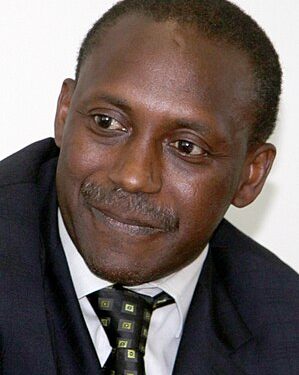By Julius A. Gulama, Illinois, USA
As Sierra Leone looks toward the post-Maada Bio era, one name continues to dominate conversations about the country’s future leadership: Dr. Kandeh Kolleh Yumkella. With an illustrious career spanning academia, international diplomacy, and national politics, Yumkella stands out as a statesman uniquely positioned to guide Sierra Leone into its next chapter.
Born in 1959 in Samu Chiefdom to one of SLPP’s founding fathers, PC Bai Shebora Yumkella II, of Samu Chiefdom, Kambia District, Yumkella’s rise has been underpinned by an impressive academic journey. He earned a Bachelor’s degree in Agricultural Economics from Njala University College, before pursuing a Master’s in Agricultural Economics at Cornell University, and ultimately a PhD in Agricultural Economics from the University of Illinois. This rigorous academic training gave him both the technical knowledge and analytical discipline that would later define his career.
Yumkella began his professional life as a university lecturer, where he inspired a generation of students. His early promise in academia was briefly interrupted when he was appointed Minister of Trade, Industry, and State Enterprises under the NPRC military government between 1994 and 1995 when he was 35 years old. Though his tenure was short, it provided him with valuable exposure to governance in a fragile state context. He returned to academia, but his ambitions soon carried him onto the global stage.
Yumkella’s breakthrough came with his career in the United Nations system. Rising through the ranks, he eventually became Director-General of the United Nations Industrial Development Organization (UNIDO), serving from 2005 to 2013. There, he was widely praised for revitalizing an organization that many had considered stagnant, turning UNIDO into a more dynamic player in global industrial policy.
He later served as the Special Representative of the UN Secretary-General for Sustainable Energy for All (SE4ALL), where he championed energy access as a driver of development, poverty reduction, and climate resilience. His role gave him global visibility, building networks with world leaders, policymakers, and international investors, an experience that few Sierra Leonean politicians can rival.
In 2015, after decades of global service, Yumkella returned to Sierra Leone to join national politics. Initially, through the SLPP, but he became disillusioned with what he described as entrenched factionalism and left to form the National Grand Coalition (NGC) in 2017. Though the NGC did not win the presidency in 2018, it gained parliamentary representation and injected new ideas into Sierra Leone’s political debate.
By 2021, Yumkella rejoined the SLPP, positioning himself once again within the mainstream of national politics. He now serves as Chair of the Presidential Initiative on Climate Change, Renewable Energy and Food Security, a role through which he has been tasked with tackling some of the nation’s most pressing challenges.
Despite his towering credentials, Yumkella has faced criticism over his shifting political affiliations. His decision to break away from the SLPP in 2017, form the NGC, and later return to the SLPP has led some to label him inconsistent, even untrustworthy. Detractors argue that his moves suggest personal ambition outweighs party loyalty.
However, Yumkella has repeatedly defended his choices as acts of principle. When leaving the SLPP, he cited frustration with internal dysfunction and the lack of space for reformist voices. Founding the NGC, he explained, was an attempt to give Sierra Leoneans a credible alternative to the two-party deadlock that had dominated politics for decades. “I wanted to break the cycle,” he once said, “and show that Sierra Leoneans could organize around ideas, not just party colors.”
His return to the SLPP, according to Yumkella, was not a betrayal of that vision but a recognition that lasting transformation requires building consensus within established structures. By rejoining the SLPP and accepting leadership roles in climate and energy policy, he positioned himself to implement reforms at scale, rather than from the margins.
Supporters also note that Yumkella’s credibility rests not merely on party loyalty but on his record of delivery. From transforming UNIDO into a more dynamic organization, to spearheading global energy reforms at the UN, to now guiding Sierra Leone’s Presidential Task Force, Yumkella has demonstrated consistency in one area above all: commitment to development.
For many observers, this pragmatic blend of idealism and realism is exactly what Sierra Leone will need in 2028, a leader who can inspire with vision, and also navigate the realities of governance.
As President Julius Maada Bio approaches the end of his second term in 2028, the question of succession looms large. Sierra Leone faces complex challenges: diversifying the economy, managing natural resources, expanding energy access, tackling youth unemployment, and strengthening democratic institutions.
Yumkella’s supporters argue that no other prospective candidate combines technical expertise, global experience, and national political maturity as he does. His deep international networks could attract investment and technical support, while his reputation as a reformist could restore confidence in governance.
Dr. Kandeh K. Yumkella’s journey, from a small town in Kambia, to Njala University, to the global stage of the United Nations, and back to the heart of Sierra Leonean politics, is the story of a man who has seen both the challenges of his homeland and the possibilities of the wider world.
Whether President Bio ultimately succeeds will depend on political will, party dynamics, and the mood of the Sierra Leonean people. But one thing is clear: in Yumkella, Sierra Leone has a leader with the stature, experience, and vision to move the nation forward.











